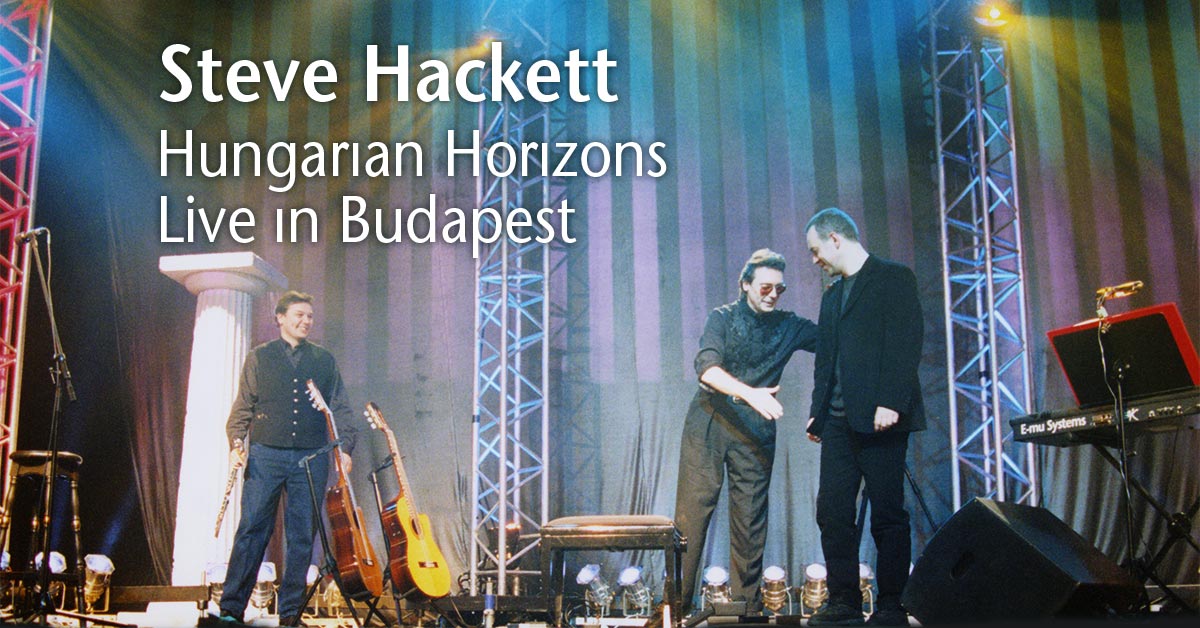- Article
- Read in 8 minutes
Steve Hackett – Hungarian Horizons: Live In Budapest – DVD/2CD review
In 2003, Hungarian Horizon was released – a DVD/2CD-package featuring a show by Steve and John Hackett along with Roger King in Budapest. Andreas Lauer reviewed the package shortly after its release back in 2003.rn
He doesn't speak much during the almost two hours of this concert. He expresses himself in his focused, tense (though never nervous), exuberantly rapturous facial expressions, but most of all in the nimble movement of his fingers whose apparent effortlessness reveals that the guitar's neck and body are their little realm; all the power pours into the musical performance.
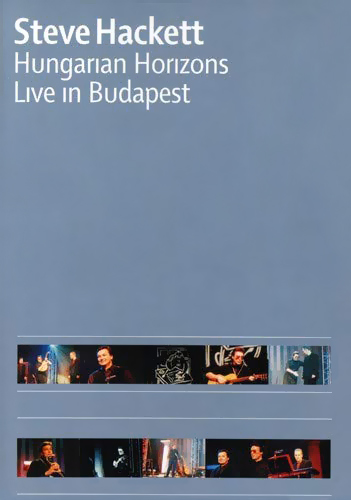
And they don't move much, the three dear gentlemen, who have come to Hungary for the first time to play a one-off concert on January 26, 2002, and now share a spacious stage under spotlights in tropical colours with a backdrop that shows a tasteful selection of impressionistic to naïve slides.
Music is at the centre of this experience, and it's something to enjoy!
Steve Hackett takes a seat in the middle of the stage lined with four simple column replica and opens the evening with some étude-like chord breaks on his Yairi acoustic guitar that finally lead to his signature melody Horizons. What follows are solo performances, or pieces for two or three with "Brother John" Hackett the on flute (located to the left) and Roger "of the Skies" King on keyboard, to the right, as well as pieces with changing instrumentation. The set is mainly structured on the basis of creating variety.
Steve's solo performance
The persistent andante over the mostly dominant deep E of Bay Of Kings, the title track of Hackett's first acoustic album from 1983, challenges the patience of the modern listener. Hackett introduces it with stylish arpeggios that don't belong to the original.
Inspired by the Basque Country, The Barren Land and Black Light, both from Bay Of Kings, are performed next, with the former played in a shortened version.
Time Lapse At Milton Keynes, with all its nostalgia for the 1982 Genesis Reunion concert, stays close to the original version on the single for Cell 151.
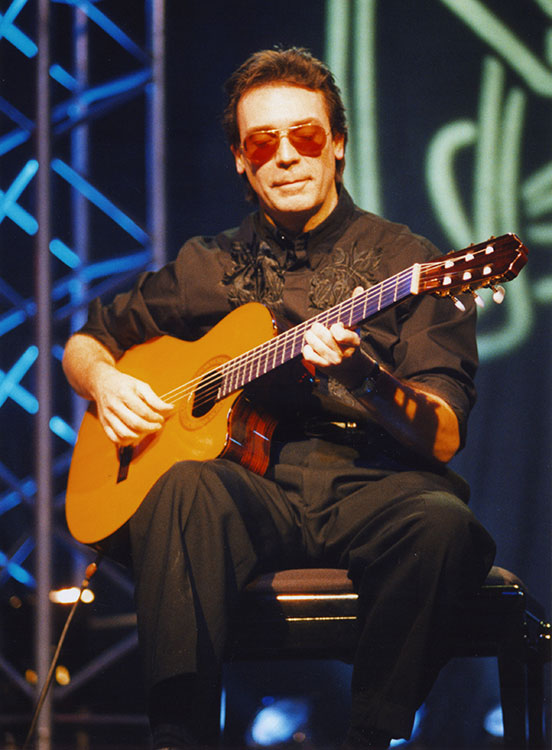
Mustard Seed by Steve's version of Shakespeare's Midsummer Night's Dream (1997) is, unfortunately, is dominated by the notes played on the three higher strings, so the softer sounds of the lower strings go under, as it were.
Steve then presents Little Cloud, a new piece that, after a delightful beginning, turns out to be a mosaic of various playing styles and improvisational approaches.
One of the staples at this kind of Steve's concerts is the Andante in C by a composer named Giuliani (a.k.a. the title tune of Tales Of The Riverbank and once released as the B-side of Hope I Don't Wake).
Skye Boat Song (folksy, included on the Bay Of Kingsre-releases), By Paved Fountain from A Midsummer Night's Dream, an Etude in A Minor and a few bars from the introduction of Blood On The Rooftopsare played en bloc.
The last piece Steve plays solo is End Of Day, known from the "official live bootleg" There Are Many Sides To The Night (1995), introduced by a passage that has been given the special title of "C minor triplets".
John's solo performance
John give us an extraordinary performance of Syrinx, Claude Debussy's (1862-1918) famous solo piece for flute. The interpretation itself is not that extraordinary, (it may perhaps even be a bit nervous), but the acoustic environment: A very slight echo is added to this musical gem, which is not heard in classical recordings. John's instrument is also extraordinary, a custom-made instrument with a very unusual shape to overcome a health issue (he speaks about this in the interview that was conducted in the afternoon before this concert).
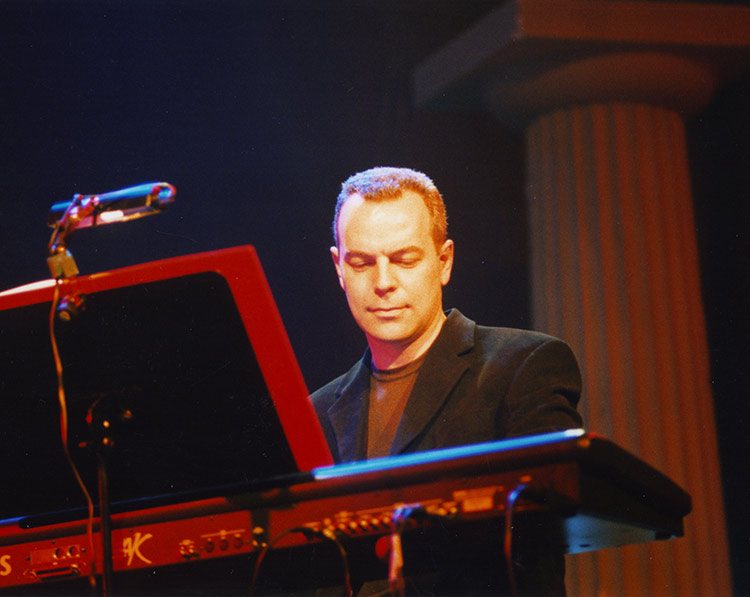
Gitarre and Keyboard
Steve played one movement from a Concerto in D by Antonio Vivaldi (1678-1741) (Steve also wrote a script for Vivaldi's life years ago), as on There Are Many Sides… In Steve's arrangement, the guitar plays a monody over a blanket of strings.
Similarly arranged are the themes from Ennio Morricone's film music for Cinema Paradiso (also released on the live CD in 1995) and Walking Away From Rainbows from his 1993 comeback album Guitar Noir. Finally, the keyboard strings underpin the harmonies of Bay Of Kings' classic The Journey.
Trio performances
The first of the six Gnossiennes(written by Érik Satie between 1889 and 1897) ring out in the well-known arrangement from Sketches Of Satie (2000), supplemented by keyboard pizziccati that amplify the plucked guitar chords on the unstressed counts. The flute comes into its own here with its magnificent volume, which seems particularly mysterious in the shady sound spheres of the low register.
In the early years of Steve's solo career, the flute often played a leading role in various rock pieces. This is also the case with Jacuzzi(from the 1980 Top Ten album Defector) and in the instrumental parts of Overnight Sleeper (Cured, 1981). Jacuzzi, with demanding double reed passages for the flute, is played with the usual élan, and in the short and good part from Overnight SleeperSteve is heard and seen strumming the guitar. Steve uses a few bars from Marigold(Bay Of Kings) as a transition between the two parts. Roger King mainly provides string harmonies before he is allowed to switch to piano sound in the end. The fact that technical interruptions during the concert were cut out of the footage for this release becomes apparent when the video shows Steve putting down the microphone after the announcement of these two tracks while the music already begins.
Steve announces Kimin Hungarian. The piece uses the arrangement from Bay Of Kings, although I wonder whether the percussion sounds really were necessary … When one of Satie's Gymnopédiesbegins to play a few minutes later you realize Kim owes to Satie's music.
Hairless Heartis one of three tracks of the evening that were first released on Genesis albums. The guitar plays the quiet "verses" of this instrumental piece by The Lamb Lies Down On Broadway (1974), accompanied by staccato chords of the keyboard; the flute takes the lead in the chorus parts.
The first of Satie's three Gymnopédiesis performed with sustained string chords from the keyboard (instead of the pizzicati of the Gnossienne); an electronic oboe d'amore play the same melody as the flute colla parte and an octave lower.
A musical treat follows with the previously unreleased Jazz On A Summer's Night. Two contrasting parts alternate here several times: one is impulsive, with rough flute playing à la Ian Anderson (Jethro Tull), in Spanish harmony sequences, the other lyrically playful; the whole thing is interrupted by a calm middle part; the interaction of flute and guitar is wonderful; the keyboard has only supporting harmony function.
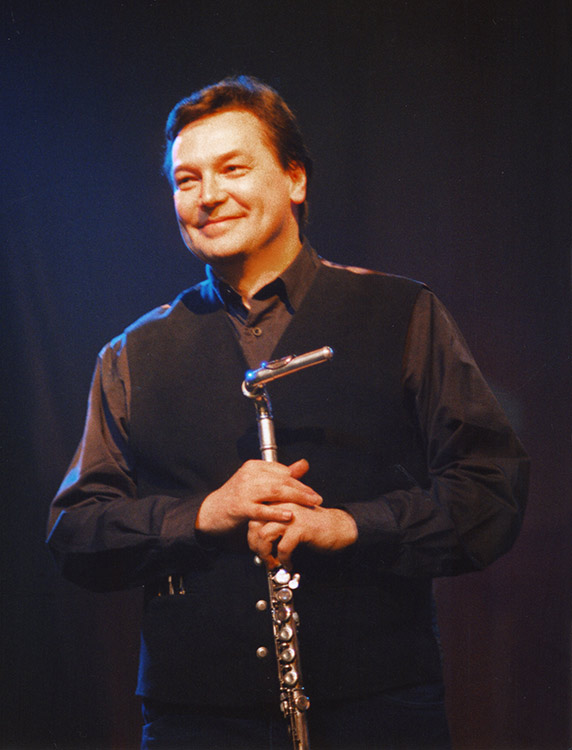
The Concert For Munich (from Momentum, 1988) leaves off string introduction played by the keyboard. The flute glides through all registers and really comes into its own again.
Hands Of The Priestessis performed quite true to the original, and not divided in two or interwoven with other pieces. The song comes from Steve's first solo album Voyage Of The Acolyte (1975) and is one of John Hackett's favorites. The long melodic arcs repeated several times give it a very meditative character. The piece ends with the ending of the song There Are Many Sides To The Night(from Guitar Noir).
Ace Of Wands is the first track from Voyage. It is a piece that is hard to classify stylistically. Since Steve does not use the electric guitar for the first few bars, the flute strikes somewhat rougher notes – as in Jazz On A Summer's Night.
Ace Of Wands is a fine ending for the main set. The trio returns to an encore à la carte: Three short new pieces are played. They still feel a bit improvised, but they sound very promising:
Steve plays an ostinato of four notes on the guitar in Idyll. John adds "abstract" tone sequences with little tonal reference, partly with double and flutter tongue, and Roger King tries to harmonize the whole thing with glass harmonica sounds.
While Steve keeps plucking a major chord in three-four time in Aubade, Roger plays an insanely funny sounding melody on the keyboard with the tutti sound of a big English pipe organ. The flute plays colla parte with the keyboard. When Roger turns the page, the audience notices that Roger and John, in contrast to Steve, have sheet music before them.
The last piece is another, far too short attempt to transcend the worlds of major and minor and functional harmony. Due to its brevity, Méditation has not yet earned its name, but sounds promising.
Programme items with changing line-ups
Steve introduces a colourful medley with a few bars from Johann Sebastian Bach's Bourrée. This is spelt wrong with only one 'r', as in the Momentum re-release. It is immediately followed by Bacchus, played by the trio. This intriguing piece already appeared under this title on There Are Many Sides …, but has also had the titles The Baroque and Puck(on A Midsummer Night's Dream); it is unclear why they reverted to the the old name again – By Paved Fountain should have been called Beja Flor again by the same logic. The long middle section of Bacchusis the three musicians jamming, interspersed with jazzy echoes, that leads to the flute solo of Firth Of Fifthbefore finally returning to the Bacchus main theme.
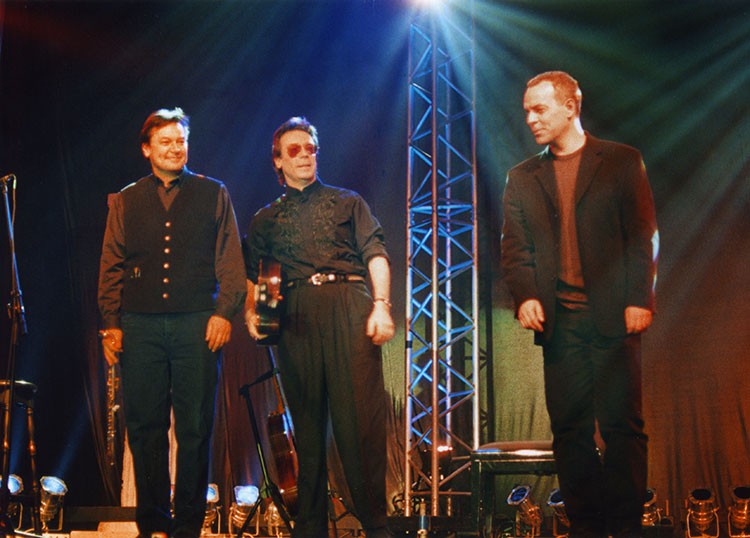
Even reminiscences of GTR have their place in this concert. Second Chance is introduced with the acoustic guitar intro to Imagining by GTR (1986) accompanied by string harmonies. Second Chance is performed in the usual version but with a looser arrangement of the flute part,
The Chinese Jam is a highlight of the show. Steve first paraphrases Cobweb or Moth (from Midsummer Night's Dream), until the flute and, later, the piano come in. Stylistic elements of Chinese folk music are combined with touches of atonality or "noise music" to create the musical equivalent of a lunar landscape.
Finally, Cavalcanti by Momentumis also part of the set. It stays true to the original with the use of flute and keyboard strings towards the end.
The repertoire, the stage performance, the careful editing and the attractive sound are worth the money for the DVD. You can choose between Dolby Stereo, Dolby Surround 5.1 and dts Surround 5.1. A short documentary (A Weekend Show In Budapest) is added as a little gimmick. It shows the trio at rehearsals and at the soundcheck in the afternoon, on their arrival in Budapest, in the dressing room and at various interviews. There is also be an interview with the three of them. You can listen to in the English original or with Hungarian voice-over. You don't hear anything really new, but you can have a great time with one or the other answer. The documentary is a nice idea, but the soundcheck excerpts could have been shortened a bit. They hardly speak at all and the songs are played exactly as in the evening.
The packaging, which also contains two audio CDs with the concert in addition to the DVD, is well-designed and peppered with numerous concert photos. Those, as you can see from the credits, were taken by Helmut Janisch, among others. There is no separate booklet.
All in all, the concert is certainly an experience for all friends of real music. It serves a broad spectrum of styles at a high level of composition and performance. And this concert experience will open new horizons even for the most sophisticated connoisseur of Steve's music …
Author: Andreas Lauer
English by Martin Klinkhardt
Photos: Helmut Janisch

